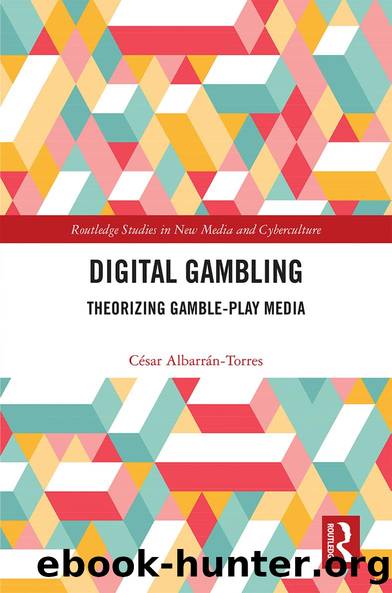Digital Gambling by César Albarrán-Torres

Author:César Albarrán-Torres [Albarrán-Torres, César]
Language: eng
Format: epub
Tags: Social Science, Media Studies, Games & Activities, Gambling, General, Video & Mobile
ISBN: 9781351398213
Google: qnlTDwAAQBAJ
Barnesnoble:
Goodreads: 38726084
Publisher: Routledge
Published: 2018-03-28T03:11:13+00:00
It would be pertinent to add that the presence of pokerbots (fully digital players generated by the machine who camouflage as real players) is one of the foremost and most insidious worries that players have to face. As McMullan states in regard to Wood and Griffithsâs 2008 study analysing the main concerns of Swedish online poker players, âplayers believed that poker bots operated by gambling sites, as well as computer viruses operated by other players, were depriving them of winningsâ (McMullan, 2012, p. 101). Ed Miller, a self-proclaimed âpoker authorityâ, wrote on his website, www.notedpokerauthority.com, that âtwo excellent players who have mastered colluding will be damn near unbeatableâ (Miller, 2006). He also stated that âthe most direct threat to online poker is colluding bots. By themselves, bots are a major threat to online poker. Bot software is now available to the public at a very affordable priceâ (Miller, 2006).
The lack of strict government intervention due to the partial legality of many online poker sites has triggered instances of community self-regulation, such as the forums in online casinos such as PokerStars or comment threads in casinosâ Facebook pages. In Australia, the legal framework that governs online gambling is determined by the Interactive Gambling Act 2011, which was subject to a review in 2011 to accommodate new technological and industry trends. However, the implementation of the recommendations emanating from this review has been inconclusive.
Generally, online communities are formed to tackle each one of these issues. Since the early days of online gambling in the early 1990s, forums have been created where players act as cyber-watchdogs of sorts, identifying malpractices and newly acquired skills to trick the machine and other players, which constitutes cheating or at least uneven competition. Casinos take advantage of one of the fundamental shortcomings of digital gambling â the uncertainty over the fairness of the games â to assert their trustworthiness. Casinos earn customer loyalty by acquiring industry-generated certifications.
Digital gambling networks provide gamblers with new forms of agency. Forums such as Cards Chat: A Worldwide Poker Community (www.cardschat.com) allow gamblers to disseminate tips and appraisals of online casinos outside of the official channels provided by casinos. It is unclear, however, if casino personnel are involved in these chat rooms as âlurkersâ or even as supposed gamblers. Websites such as Casino Scam Report (www.casinoscamreport.com) keep track of malpractices in the industry via crowdsourcing, and prevent gamblers from âbeing scammed by online casinos that donât pay out winnings to their playersâ (Casino Scam Report, 2013). Websites such as these establish new dynamics of accountability for casinos in which users help define how trustworthy each casino is.
The digital media practices described in this chapter reframe the routines associated with gambling and open up avenues for new modes of engagement, seduction and control.
Download
This site does not store any files on its server. We only index and link to content provided by other sites. Please contact the content providers to delete copyright contents if any and email us, we'll remove relevant links or contents immediately.
Still Foolin’ ’Em by Billy Crystal(36359)
Spell It Out by David Crystal(36117)
The Great Music City by Andrea Baker(32019)
Professional Troublemaker by Luvvie Ajayi Jones(29663)
Trainspotting by Irvine Welsh(21667)
Call Me by Your Name by André Aciman(20517)
The Secret History by Donna Tartt(19090)
We're Going to Need More Wine by Gabrielle Union(19046)
Cat's cradle by Kurt Vonnegut(15357)
Ready Player One by Cline Ernest(14677)
Molly's Game by Molly Bloom(14145)
Bombshells: Glamour Girls of a Lifetime by Sullivan Steve(14076)
The Goal (Off-Campus #4) by Elle Kennedy(13674)
Leonardo da Vinci by Walter Isaacson(13337)
4 3 2 1: A Novel by Paul Auster(12393)
The Social Justice Warrior Handbook by Lisa De Pasquale(12190)
The Break by Marian Keyes(9368)
Crazy Rich Asians by Kevin Kwan(9292)
The remains of the day by Kazuo Ishiguro(9000)
